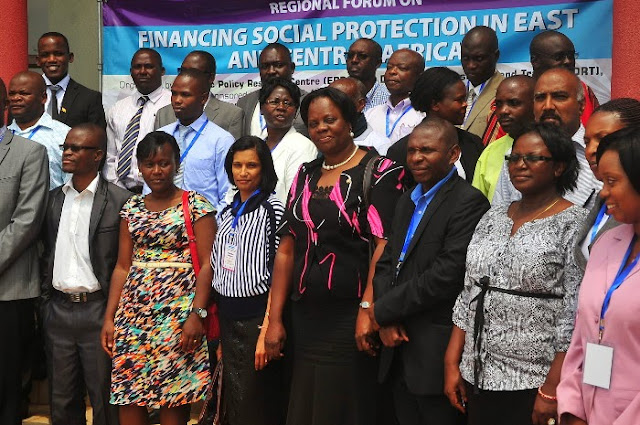Regional conference on social protection opens in Kampala
 |
| Some of the participants at the conference at the Lake Victoria Serena Resort in lweza |
A two day conference focusing on financing social protection in East and Africa opened today 22nd October 2013 in Uganda at the Lake Victoria Serena Resort in Lweza.
Organised by the Economic Policy Research Centre (EPRC), a think-tank research oriented centre based in Uganda, the conference seeks to stimulate discussion about various options of financing of social protection programmes, particularly in low income countries, especially in Eastern and Central Africa.
Speaking at the opening of the conference, Dr Sarah Ssewanyana EPRC’s executive director said the high population growth rate in Africa is increasing the demand for social protection programmes but the budgets allocated to it have declined as governments focus on infrastructure development.
“The conference is very important and timely partly because populations affected by poverty and destitution remain very large in the region and without reliable and predictable resource allocation to social protection,” Dr Ssewanyana says.
Social protection consists of policies and programs designed to reduce poverty and vulnerability by promoting efficient labour markets, diminishing people's exposure to risks, and enhancing their capacity to manage economic and social risks, such as unemployment, exclusion, sickness, disability and old age. (Wikipedia)
The conference is organised in partnership with the Friedrich Ebert Stiftung (FES), ThinkTank Initiative and Development Research and Training (DRT) attracted participants from Uganda, Zambia, Malawi, Kenya, Rwanda, Ethiopia, and Tanzania.
Ms Ssewanyana however expressed concern that many governments were still not allocating enough to social protection and advised that the discovery of oil has the potential to change social protection financing.
“The discovery of commercially viable deposit of natural resources in the East and Central Africa region has the potential to change the social protection financing landscape in the region,” she says.
Otherwise currently, most of the social protection programmes are donor funded which is not sustainable and raises the question of ownership, said Mr. Charles Lwanga-Ntale, the Director Africa, Development Initiatives. He said that rather than donors financing it, citizens, governments or a critical mass of elites should be able to finance social protection.
Beatrice Mugambe Executive Director for Development Research and Training added, “We are keen to hear about innovative ways of mobilising resources and effective ways of using them to achieve social protection objectives in our countries.”
Speaking at the opening of the conference, Dr Sarah Ssewanyana EPRC’s executive director said the high population growth rate in Africa is increasing the demand for social protection programmes but the budgets allocated to it have declined as governments focus on infrastructure development.
“The conference is very important and timely partly because populations affected by poverty and destitution remain very large in the region and without reliable and predictable resource allocation to social protection,” Dr Ssewanyana says.
Social protection consists of policies and programs designed to reduce poverty and vulnerability by promoting efficient labour markets, diminishing people's exposure to risks, and enhancing their capacity to manage economic and social risks, such as unemployment, exclusion, sickness, disability and old age. (Wikipedia)
The conference is organised in partnership with the Friedrich Ebert Stiftung (FES), ThinkTank Initiative and Development Research and Training (DRT) attracted participants from Uganda, Zambia, Malawi, Kenya, Rwanda, Ethiopia, and Tanzania.
Ms Ssewanyana however expressed concern that many governments were still not allocating enough to social protection and advised that the discovery of oil has the potential to change social protection financing.
“The discovery of commercially viable deposit of natural resources in the East and Central Africa region has the potential to change the social protection financing landscape in the region,” she says.
Otherwise currently, most of the social protection programmes are donor funded which is not sustainable and raises the question of ownership, said Mr. Charles Lwanga-Ntale, the Director Africa, Development Initiatives. He said that rather than donors financing it, citizens, governments or a critical mass of elites should be able to finance social protection.
Beatrice Mugambe Executive Director for Development Research and Training added, “We are keen to hear about innovative ways of mobilising resources and effective ways of using them to achieve social protection objectives in our countries.”
 |
| Mr. Charles Lwanga-Ntale, the Director Africa, Development Initiatives |
“Social protection has to become a political issue. If you went to your Member of Parliament and challenged them and made it a point to raise the question; why it is that you don’t have social protection on your political agenda? If it becomes a political issue, you will discover that resources are found somewhere. Resources are not the issue but allocation.” he said.


Comments
Post a Comment